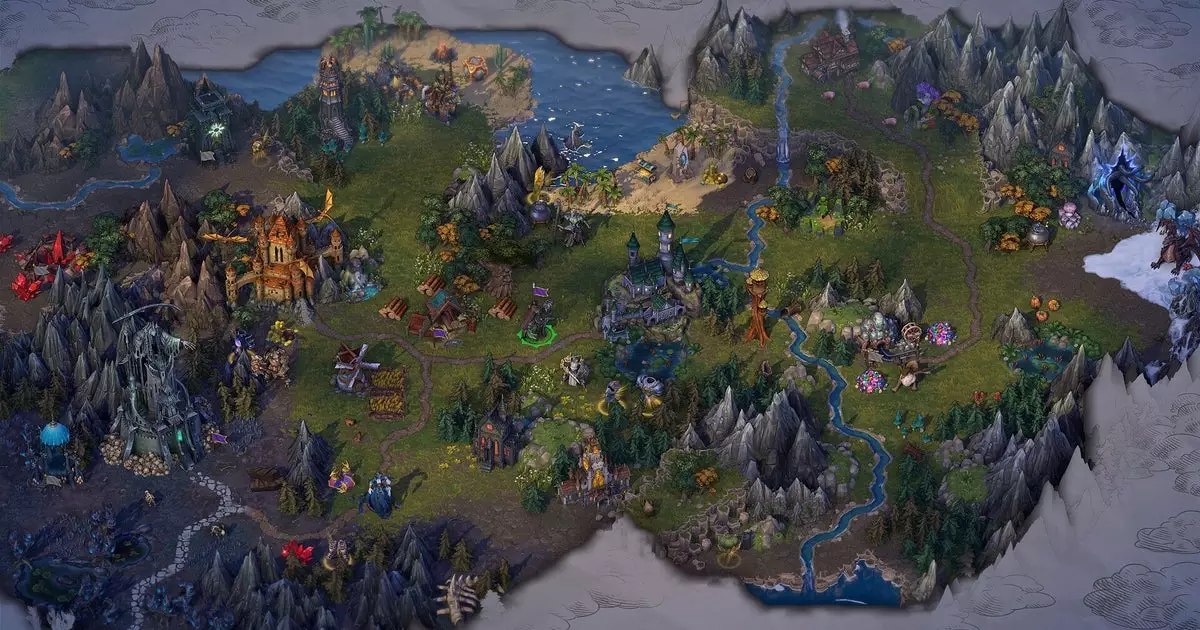In the ever-evolving landscape of the gaming industry, major publishers like Ubisoft are increasingly adopting unconventional strategies to manage their portfolios. The recent decision to entrust the publishing duties of *Heroes of Might and Magic: Olden Era* to Hooded Horse signals a notable pivot. Traditionally, Ubisoft has maintained tight control over its flagship franchises, reinforcing its brand identity and revenue streams. By handing over the publishing responsibilities, Ubisoft seems to be entering a phase of strategic realignment, possibly driven by internal financial pressures, shifting market dynamics, or a desire to foster innovation without the burden of full ownership.
This move highlights a broader industry trend—where large corporations partner with specialized, often smaller publishers—to maximize potential while minimizing risk. Hooded Horse, a rising force recognized for niche yet critically acclaimed strategy titles, is positioned as a perfect match due to its targeted expertise. Such collaborations allow giants like Ubisoft to maintain a broad portfolio without overstretching their resources, while niche publishers gain vital credibility and access to established IPs.
Financial Logic or Strategic Diversification? Unpacking the Motivations
Speculation about Ubisoft’s motives suggests that financial considerations are likely a primary factor. Large companies are under constant pressure to optimize costs and improve profit margins, especially amid internal restructuring and a challenging global economic environment. Divesting publishing rights—particularly for titles that may not currently align with their core strategic priorities—can free up resources for more lucrative ventures or future projects.
Additionally, Ubisoft’s recent internal fragmentation—splitting into separate entities focusing on different segments—may have complicated how they view and handle legacy franchises. While some franchises like Assassin’s Creed and Rainbow Six are being aggressively pushed, others like *Heroes of Might and Magic* might be seen as less central, prompting the decision to leverage third-party publishers with a proven track record.
Yet, the decision isn’t purely financial. The move could also reflect a shift towards emphasizing innovation and local expertise. Hooded Horse’s track record with strategy titles indicates they understand the genre’s nuances and community needs better than a sprawling publisher might. This decentralization could be an attempt by Ubisoft to foster creativity and cater to niche audiences more effectively, recognizing that specialized publishers can sometimes cultivate stronger connections with dedicated fans.
The Implications for Legacy Series and Fan Expectations
Handing over an iconic franchise like *Heroes of Might and Magic* raises concerns among fans and industry watchers. Such franchises come with a rich history, a dedicated fan base, and a defined set of expectations. Large companies steering these IPs often face scrutiny over potential compromises—whether it’s a shift in design philosophy, commercialization, or diminished oversight.
In this case, Ubisoft’s statement emphasizes ongoing involvement, suggesting that they retain ownership and will support the project where needed. However, the level of influence they will exercise remains uncertain. Fans often worry that third-party publishers, especially newer entrants, might prioritize commercial viability over respecting the franchise’s original spirit.
On the other hand, this move may innovate the franchise’s future by infusing fresh ideas from a publisher that specializes in strategy rather than trying to retrofit a broader corporate strategy. If Hooded Horse delivers on its promise of better visibility and expanded regional reach, the series could find new life and a broader audience, especially among fans who missed out on earlier titles or the series’ modern iterations.
What Does This Mean for the Future of Classic Gaming Icons?
The decision by Ubisoft underscores a fundamental shift in how major corporations handle their storied intellectual properties. It suggests a willingness to experiment with less traditional models—outsourcing, partnering, and collaborating—rather than solely relying on in-house development and publishing. This approach might pave the way for a renaissance of long-dormant franchises, reintroduced via publishers with a genuine passion and a focused strategy.
Furthermore, the move hints at a potential future where legacy IPs are no longer owned and controlled exclusively by their original creators. Instead, they become shared assets, nurtured by multiple stakeholders who bring their strengths to the table. Such collaboration could lead to higher-quality products that respect original lore while exploring innovative gameplay mechanics or visual styles.
However, this model demands transparency and careful management. Players and community members are increasingly aware of corporate motives, and their trust hinges on preservation of the franchise’s core qualities. Ubisoft’s involvement may offer reassurance, but it also raises questions about the degree of oversight and creative control. Ultimately, the success of this approach will rely on balancing commercial interests with authentic creative vision—an intricate dance that can define the future landscape of classic game series.


Leave a Reply